- Home
- Carolyn Keene
Nancy's Mysterious Letter
Nancy's Mysterious Letter Read online
Table of Contents
Title Page
Copyright Page
CHAPTER I - Stolen Letters
CHAPTER II - Vanished Money
CHAPTER III - A Baffling Note
CHAPTER IV - Doubtful Inheritance
CHAPTER V - The Mysterious Gift
CHATTER. VI - A Good Lead
CHAPTER VII - The Wrecked Car
CHAPTER VIII - Disheartening Request
CHAPTER IX - “He’s Not a Suspect!”
CHAPTER X - Search for a Bride
CHAPTER XI - The Strange Messages
CHAPTER XII - A Fresh Puzzle
CHAPTER XIII - Locked In
CHAPTER XIV - Elusive Niece
CHAPTER XV - A Worse Mix-up
CHAPTER XVI - Mistaken Identity
CHAPTER XVII - Fake Summons
CHAPTER XVIII - Skakespearean Puzzle
CHAPTER XIX - A Trap
CHAPTER XX - Shattered Bells
NANCY’S MYSTERIOUS LETTER
BY mistake Nancy Drew receives a letter from England intended for an heiress, also named Nancy Drew. When Nancy undertakes a search for the missing young woman, it becomes obvious that a ruthless, dangerous man is determined to prevent her from finding the heiress or himself. Clues that Nancy unearths lead her to believe that the villainous Edgar Nixon plans to marry the heiress and then steal her inheritance.
During her investigation Nancy discovers that Nixon is engaged in a racket that involves many innocent, trusting persons. The thrilling hunt for Nixon and the heiress takes Nancy in and out of many perilous situations.
How the teen-age detective saves the British heiress from the sly, cunning schemer makes a highly intriguing story of mystery and suspense.
Ned pulled Nancy down to the pavement
Copyright © 1996, 1968, 1932 by Simon & Schuster, Inc.
All rights reserved. Published by Grosset & Dunlap, Inc., a member of The Putnam &
Grosset Group, New York. Published simultaneously in Canada. S.A.
NANCY DREW MYSTERY STORIES® is a registered trademark of Simon & Schuster, Inc.
GROSSET & DUNLAP is a trademark of Grosset & Dunlap, Inc.
Library of Congress Catalog Card Number: 68-15295
eISBN : 978-1-101-07709-2
http://us.penguingroup.com
CHAPTER I
Stolen Letters
“OH, poor Ira!” Nancy Drew exclaimed and slowed her convertible.
The two girls with her turned to look toward the sidewalk. Trudging along was an elderly mail carrier. He was lugging a heavy bag over one shoulder. His head was down and his eyes were almost closed against the strong November wind that swirled leaves and dirt around him.
“Mr. Nixon!” Nancy called out of her open window. “Let me give you a ride.”
The mail carrier looked up and managed a smile. “Hello, Nancy,” he said. “Thank you, but I have to stop at every house. Lots of letters today. There’s one in the bottom of my bag for you. It was sent air mail from London, England.”
“How exciting!” Nancy said. “Well, I’ll see you at the house.” She added, “I’ll have some hot cocoa waiting for you.”
Mr. Nixon smiled and Nancy drove on.
“I don’t know anyone in London,” she said to her friends. “Who could be writing to me?”
The attractive, titian-blond, blue-eyed girl at once became lost in thought.
“Another mystery probably,” remarked her dark-haired companion, George Fayne. George was an attractive, slender girl, who kept her hair short and always wore tailored clothes.
Her cousin, seated next to her, was blond and slightly overweight. When Bess Marvin grinned, her deep dimples showed prominently. “Maybe you have an unknown admirer in England, Nancy,” she said.
George gave Bess a dark look. “Do you always have to think of the romantic side of things?”
Bess tossed her head. “What’s more fun?” she retorted.
The three girls were returning from an overnight visit to Red Gate Farm, where at one time Nancy, with the help of her two friends, had captured a counterfeiting gang. The solving of that mystery had been followed by Nancy’s tracking down The Clue in the Diary.
The trunk of Nancy’s convertible was filled with fruits and vegetables from the farm. When she reached the rear of her home, the Drews’ housekeeper, Mrs. Hannah Gruen, opened the door and rushed down the steps.
“Nancy, you’re home!” she cried out, and gave the girl a hug. “Hello, Bess. Hello, George.”
As Nancy unlocked the trunk of her car, she said, “We met Ira Nixon down the street. He’s bringing another mystery!” She told the housekeeper about the letter from England. “Poor Ira is half-frozen. I promised him some hot cocoa When he gets here.”
“I’ll go right in and make it,” said Mrs. Gruen. “You girls unload the car. My, what a lot of stuff and it smells wonderful!”
Nancy and her friends had just finished putting the farm products into the Drews’ cold cellar when the front doorbell rang. Nancy hastened to answer it.
Mr. Nixon stood there. As he set his mailbag down in the vestibule, Nancy thought, “He looks so exhausted, I hope he can finish out the year until his January retirement.”
She led the way into the living room. Nancy, although eager to see her mail, resisted the temptation to ask for it. She would wait until he was ready to give it to her.
A few moments later Bess came In carrying a tray with four cups of cocoa. Behind her was George with a big plate of homemade cookies. Hannah Gruen, who had lived with Nancy and her father since the death of the girl’s mother when she was three years old, was an excellent cook. She enjoyed baking and often surprised the family with delicious cakes and pies.
Ira Nixon sipped his cocoa slowly. He nibbled on a cookie and slowly color came into his thin face. Hannah Gruen walked in with a pot of cocoa and refilled everyone’s cup. As the mail carrier finished the second cup of cocoa, he said he must be on his way.
“I almost forgot to give you your letter,” Mr. Nixon said as he stood up, and went directly to the vestibule.
A moment later the girls heard him cry out and rushed to his side.
“What’s the matter?” Nancy asked.
“The letters! They’re gone!”
“What do you mean?” George asked, peering into the bag. There was nothing in it but magazines.
“All the letters still to be delivered have been stolen!” Ira Nixon exclaimed.
He began to sway and the girls quickly grabbed hold of him. They led him back to the living-room sofa.
“Oh dear! Oh dear!” he moaned. “Only six weeks more to my retirement and now this disgrace!”
Bess tried to soothe him. “But it wasn’t your fault.”
“It’s a rule that a mail carrier must keep his bag with him at all times,” the man said.
“All the letters have been stolen!” the mailman
exclaimed
Suddenly George turned to Nancy. “Your letter from England! Now you’ll never know who sent it.”
“And that’s not the worst of it,” Ira Nixon spoke up. “I also had a registered letter for Mr. Drew. There may have been an important document in it.”
The girls and Hannah Gruen looked at one another. Almost instantly, Nancy sprang into action.
“The thief can’t be far away,” she said. “We must try to catch him!”
The three girls put on their coats and dashed out the front door. The Drew home stood well back from the street and was reached by a curving driveway.
“You girls go left,” Nancy suggested. “I’ll go to the right.”
They ran to the street and looked in all directions. Bess and George, seeing
no one, hurried to the corner. Then George went left and Bess right.
In the meantime Nancy had spotted little Tommy Johnson, who was riding his tricycle on the sidewalk. She hurried to talk to him.
“Hi, Nancy!” he called out. “I just made a new record. Want to see how fast I can go?”
“Some other time, Tommy,” she answered. “Tell me, have you been riding past our house?”
“Sure thing.”
“Did you see anybody come from there in the past few minutes?” Nancy asked the five-year-old.
“Yep. A man.”
“What did he look like?”
Tommy thought for a moment. “Well, he—he was real thin and he was taller than you and he was in an awful hurry.”
“What was he wearing?” Nancy prodded.
Tommy giggled. “A yellow coat and hat.”
Nancy was puzzled. “You mean a yellow raincoat and rain hat?”
“Nope. It was a winter coat and hat like my daddy wears.”
“And it was yellow?” Nancy asked.
Tommy nodded. Then he grinned. “Nancy, While I was racin’ I was playin’ ’tective like you. I can tell you something else.”
Nancy stooped down so that she was on eye level with Tommy. “Tell me everything,” she pleaded.
“Will you give me a ’tective’s badge if I do?” he asked.
“I sure will,” Nancy promised. “Now tell me quickly what else you can about the man in the yellow coat.”
“I can’t tell you anything else about him, but I know something about his car.”
“Oh, he was in a car?”
“He sure was,” Tommy replied, and began to laugh. “It was a beat-up old thing. I guess he’s pretty poor.”
“What color was the car?” Nancy asked.
“Same as his coat.” Tommy paused and then said, his eyes twinkling, “You know what? I remember some of his license plate. The first part was TJ just like my name.”
Nancy asked excitedly, “Do you remember the number?”
“Not all of it. It was too long. But the first two numbers were 1-2.”
“Oh, Tommy, you’ve been a wonderful help to me,” Nancy said, giving the little boy a hug. “One more question. Did you see the man carrying anything in his hand?”
“Yep. He had a lot of letters and he was stuffin’ ’em into his pockets.”
Nancy realized that the suspect by this time was too far away for her to find. But she was excited by the excellent clues the little boy had given her. She thanked him and returned home.
At the front door she met Bess and George. Her friends reported they had had no luck. Nancy told them what she had learned. As soon as they entered the house, she hurried to the living room. Ira Nixon sat slumped in the comer of the sofa, but when he saw the girls he looked up hopefully.
“Did you find out anything about the letters?” he asked.
“I didn’t find the thief,” Nancy answered, “but I did pick up an excellent clue. Mr. Nixon, do you know a tall, slender man who wears a yellow overcoat and hat, and has a beat-up car with the license plate TJ12? I don’t know the rest of the numbers.”
To the surprise of Hannah Gruen and the girls, Ira Nixon uttered a cry of dismay. The blood drained from his face. He put his hands over his cheeks and exclaimed, “No, no! It couldn’t be! Oh, what will I do?”
Ira Nixon slumped forward in a faint!
CHAPTER II
Vanished Money
WHEN the mail carrier did not respond to first-aid treatment by Hannah Gruen and the girls, the housekeeper insisted they call a doctor.
“I’ll telephone Dr. Amundson up the street,” Nancy offered. He was not the Drews’ physician, but she was sure that in this emergency he would come.
The line was busy and continued to be so. George became nervously impatient. “Oh, why bother? I can run up there just as fast.” She grabbed her coat and went out the door.
While Mrs. Gruen continued to administer first aid to the unconscious mail carrier, she told Nancy and Bess more about him. Ira Nixon was a bachelor and lived in a small house on the other side of River Heights. It had belonged to his mother, who had survived two husbands. When she died, it was learned she had willed the property and a small amount of money to Ira.
But now a half brother, thirty years younger, was demanding fifty per cent of the money. So far, Ira had refused because the inheritance had actually belonged to Ira’s father and the mother had kept it all these years for his son.
“Ira told me his half brother Edgar has been very nasty lately and has even threatened to go to court to upset the will.”
“Poor Mr. Nixon,” Bess said softly.
The housekeeper went on to say that Edgar had become very obnoxious and had almost succeeded in intimidating Ira. She sighed, “Probably Ira won’t be able to hold out much longer—he’s too old and weak to resist.”
“Where does this half brother live?” Nancy asked.
“Ira doesn’t know. Edgar never would tell him. And also, he would never tell him what business he was in. Only yesterday when Ira came here with the mail, he told me that Edgar had been to see him the night before and became furious when Ira would not give him any money. He called him all sorts of dreadful names and finally said, ”I’ll make you suffer for this! I’ll ruin you!”
Hannah’s last statement gave Nancy an idea. “Do you suppose the person who stole the mail could have been Edgar Nixon?” she asked.
“I’ll bet it was,” Bess replied. “When you described him to Ira, the poor old man recognized who he was and that’s why he fainted. Edgar must be an absolutely despicable person.”
The others agreed. Their conversation was cut short by the arrival of George with the doctor. The girls went to the kitchen during the examination that followed, but Hannah Gruen remained with Ira.
Nancy said she should notify the police and the postal inspector about the theft. “And I’d better call Dad, too.”
When her friend Police Chief McGinnis came on the wire she gave him the story.
“We’ll put out an alarm for the man in the yellow coat,” he told her.
Nancy next called the River Heights post office. The postal inspector was not in, but an investigative aide took the message and said he would pass the word along.
Nancy’s third call was to her father’s office. Mr. Drew was a prominent attorney and his daughter always felt flattered when he asked her opinion or advice on a case where a mystery was involved. In a few minutes Mr. Drew’s secretary put the attorney on the line.
“Dad, we’ve had some real excitement at the house this morning,” she said, and proceeded to tell him what had happened. “Ira Nixon hasn’t regained consciousness yet. The doctor is here now.”
“Well, you are full of news,” Mr. Drew said. “Keep me informed on what’s happening. Now about this registered letter. I’m afraid it may have contained a large sum of money.”
Nancy was horrified. Did the thief know this and was it the reason he had waited for a chance to steal the mail?
“Where was the letter from?” she asked. “Isn’t it unusual for people to send money through the mail nowadays?”
“Indeed it is, and a very bad thing to do,” the lawyer replied. “I suspect that this registered letter may have come from a client of mine, Mrs. Quigley. I take care of most of her affairs and she sends me money every so often. I’ve told her repeatedly to mail me only checks, but I have a hunch that she has ignored my advice again.”
“Does she always send her letters to the house?” Nancy asked.
“Usually,” Mr. Drew answered. “I’ll call her at once and find out if—Hold the line a moment, Nancy.”
She waited several seconds, then her father came back on the line. “My secretary has just buzzed me to say that Mrs. Quigley is in the outer office. I’ll talk to her and call you back.”
While waiting, Nancy told Bess and George about the client who insisted upon sending large amounts of money through the mai
l. It was not long before Mr. Drew called back.
“Hello? Nancy? ... What I feared is true. Mrs. Quigley feels very bad about the whole thing. We are sure it was her letter that was stolen.”
“Oh, Dad, this makes an embarrassing situation for you, doesn’t it?” Nancy queried.
“Yes, it does,” her father replied. “Having my client’s money stolen from my house!” Then he added, “How’s Ira Nixon?”
Nancy put down the phone and hurried toward the living room, calling out, “Mrs. Gruen, my father is on the line. He wants to know how Mr. Nixon is.”
“He’s coming around,” the housekeeper answered. “The doctor says he’ll have to go to the hospital, though, for a complete checkup.”
Nancy ran back to the kitchen and reported this to her father. He sighed in relief. “I’m glad the poor old man is regaining consciousness,” he said. “Well, I must talk to Mrs. Quigley now. See you at dinner.”
Mrs. Gruen came to tell the girls that they might return to the living room. Dr. Amundson explained that he must get back to his office immediately to see a number of patients who were waiting.
“Mrs. Gruen has kindly offered to get in touch with Mr. Nixon’s regular doctor,” he said. “She will ask him to make arrangements for an ambulance to come from River Heights Hospital and take Mr. Nixon there. He’s recovering nicely, but he shouldn’t go home yet.”
Ira’s physician promised to be at the hospital by the time his patient reached there. The ambulance would arrive at the Drew home in about twenty minutes. Nancy was eager to ask the carrier some questions, but realized he was in no condition to discuss his brother. “Especially one who is so mean to him,” she thought.
Ira Nixon himself brought up the subject of the missing letters. “I feel better now. Guess that doctor’s shot put new life into me. Sorry I can’t tell you where your father’s registered letter came from. I didn’t notice.”
Nancy asked gently, “Did you, by any chance, see the return address on the envelope to me?”
Ira Nixon closed his eyes and his brow furrowed as he tried to remember. Finally he said, “Seems to me your letter was not from one person. It was more like three names.”

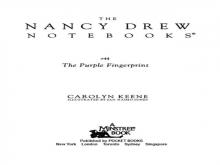 The Purple Fingerprint
The Purple Fingerprint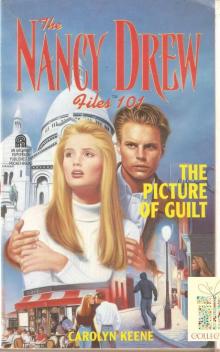 The Picture of Guilt
The Picture of Guilt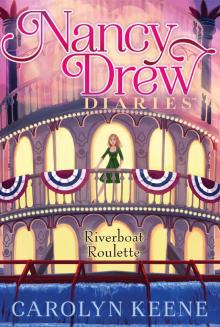 Riverboat Roulette
Riverboat Roulette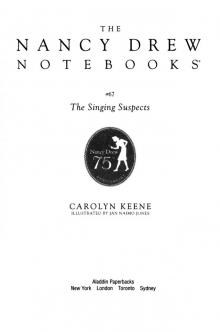 The Singing Suspects
The Singing Suspects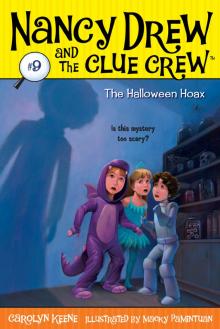 The Halloween Hoax
The Halloween Hoax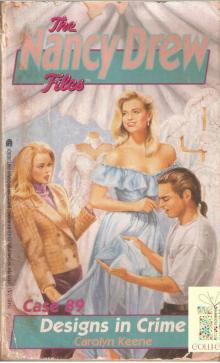 089 Designs in Crime
089 Designs in Crime The Hidden Treasures
The Hidden Treasures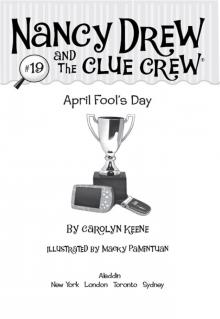 April Fool's Day
April Fool's Day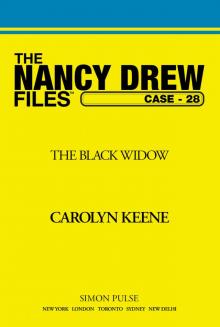 The Black Widow
The Black Widow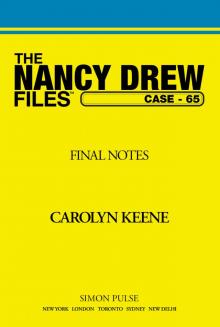 Final Notes
Final Notes The Haunting on Heliotrope Lane
The Haunting on Heliotrope Lane The Runaway Bride
The Runaway Bride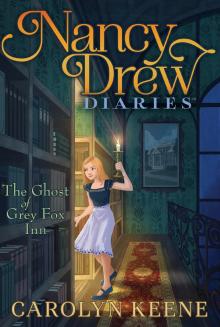 The Ghost of Grey Fox Inn
The Ghost of Grey Fox Inn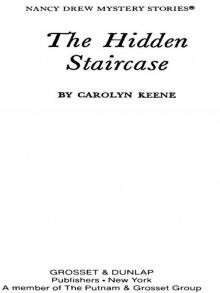 The Hidden Staircase
The Hidden Staircase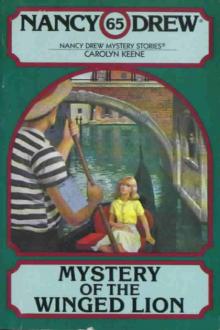 Mystery of the Winged Lion
Mystery of the Winged Lion Over the Edge
Over the Edge The Circus Scare
The Circus Scare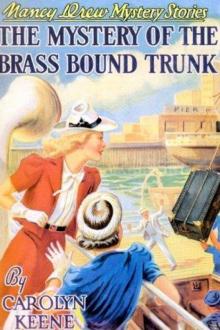 The Mystery of the Brass-Bound Trunk
The Mystery of the Brass-Bound Trunk Ski School Sneak
Ski School Sneak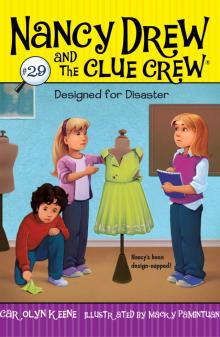 Designed for Disaster
Designed for Disaster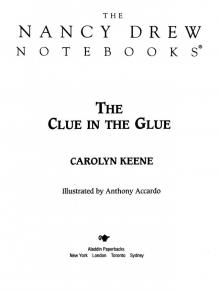 The Clue in the Glue
The Clue in the Glue Cold as Ice
Cold as Ice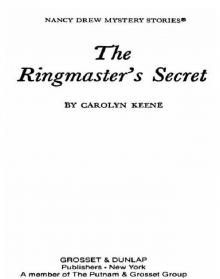 The Ringmaster's Secret
The Ringmaster's Secret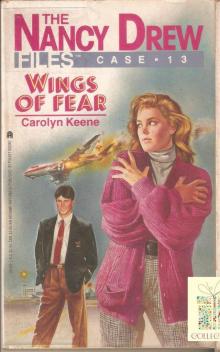 013 Wings of Fear
013 Wings of Fear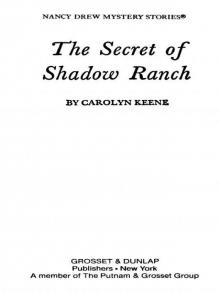 The Secret of Shadow Ranch
The Secret of Shadow Ranch Not Nice on Ice
Not Nice on Ice Earth Day Escapade
Earth Day Escapade Mystery of Crocodile Island
Mystery of Crocodile Island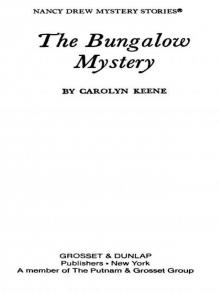 The Bungalow Mystery
The Bungalow Mystery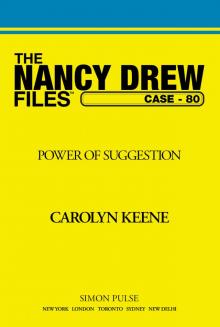 Power of Suggestion
Power of Suggestion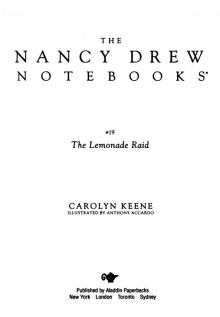 The Lemonade Raid
The Lemonade Raid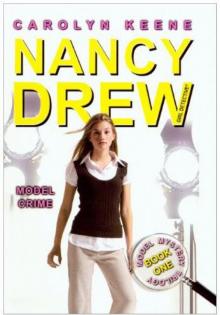 Model Crime
Model Crime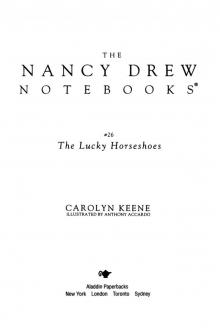 The Lucky Horseshoes
The Lucky Horseshoes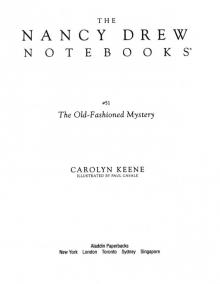 The Secret of the Old Clock
The Secret of the Old Clock The Clue at Black Creek Farm
The Clue at Black Creek Farm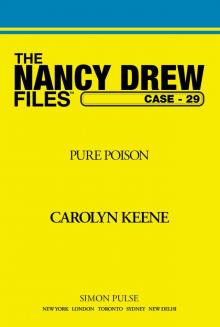 Pure Poison
Pure Poison Nobody's Business
Nobody's Business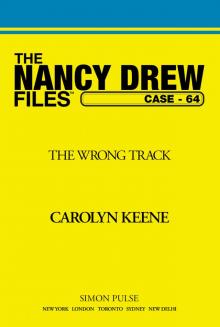 Wrong Track
Wrong Track Chick-Napped!
Chick-Napped!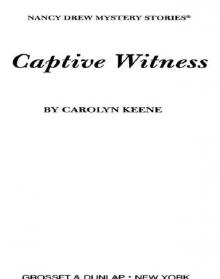 Captive Witness
Captive Witness If Looks Could Kill
If Looks Could Kill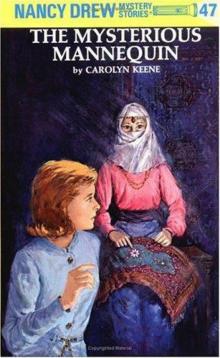 The Mysterious Mannequin
The Mysterious Mannequin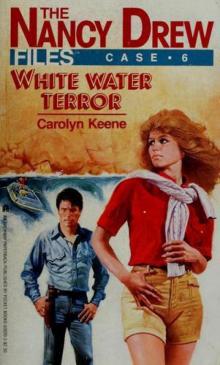 White Water Terror
White Water Terror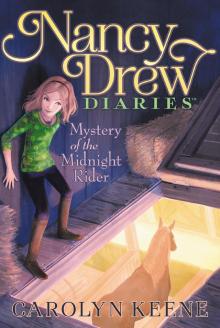 Mystery of the Midnight Rider
Mystery of the Midnight Rider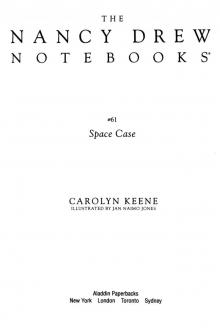 Space Case
Space Case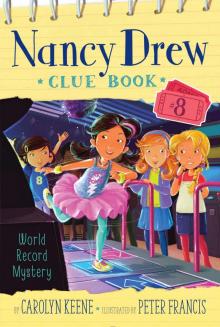 World Record Mystery
World Record Mystery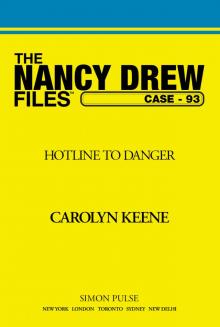 Hotline to Danger
Hotline to Danger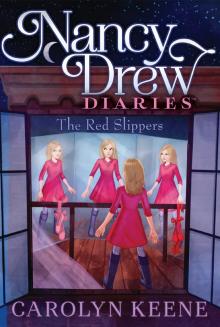 The Red Slippers
The Red Slippers A Crime for Christmas
A Crime for Christmas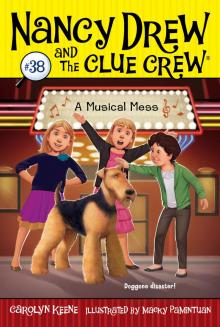 A Musical Mess
A Musical Mess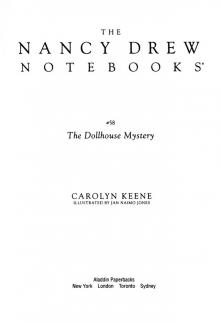 The Dollhouse Mystery
The Dollhouse Mystery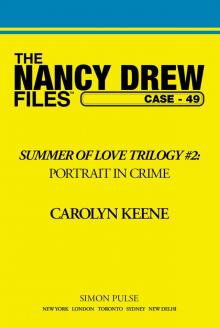 Portrait in Crime
Portrait in Crime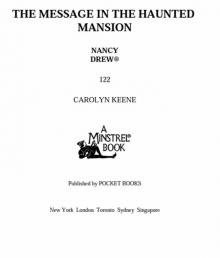 The Message in the Haunted Mansion
The Message in the Haunted Mansion Playing With Fire
Playing With Fire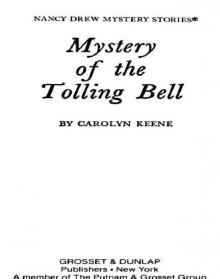 Mystery of the Tolling Bell
Mystery of the Tolling Bell Cutting Edge
Cutting Edge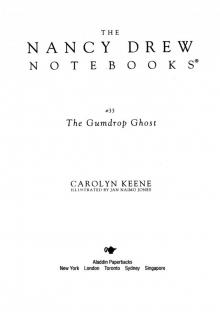 The Gumdrop Ghost
The Gumdrop Ghost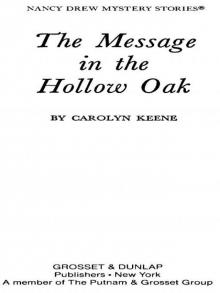 The Message in the Hollow Oak
The Message in the Hollow Oak Trial by Fire
Trial by Fire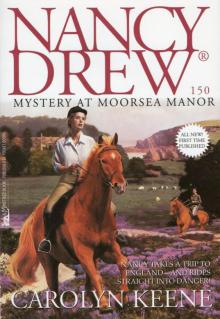 Mystery at Moorsea Manor
Mystery at Moorsea Manor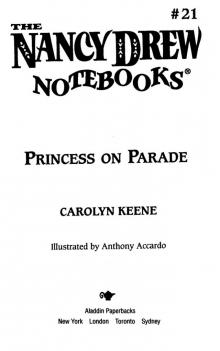 Princess on Parade
Princess on Parade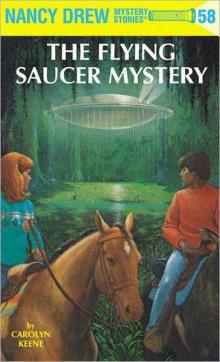 The Flying Saucer Mystery
The Flying Saucer Mystery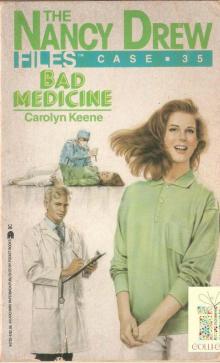 035 Bad Medicine
035 Bad Medicine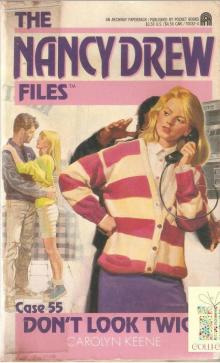 055 Don't Look Twice
055 Don't Look Twice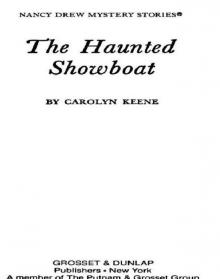 The Haunted Showboat
The Haunted Showboat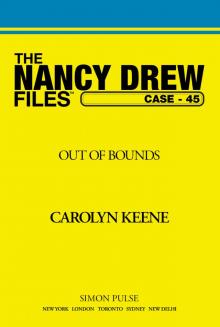 Out of Bounds
Out of Bounds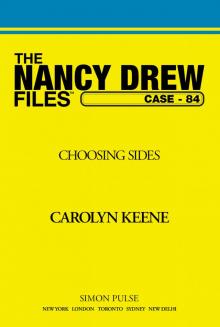 Choosing Sides
Choosing Sides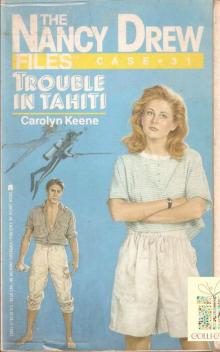 031 Trouble in Tahiti
031 Trouble in Tahiti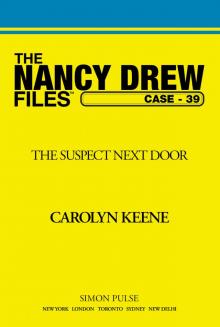 The Suspect Next Door
The Suspect Next Door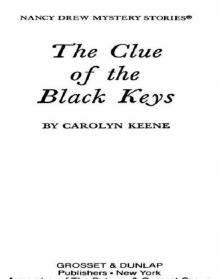 The Clue of the Black Keys
The Clue of the Black Keys The Secret Santa
The Secret Santa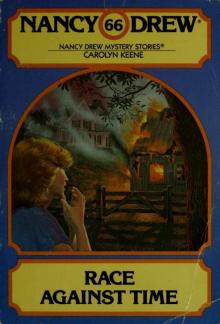 Race Against Time
Race Against Time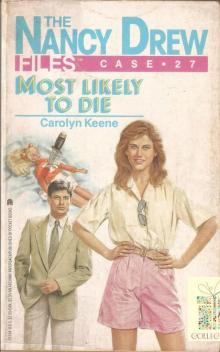 027 Most Likely to Die
027 Most Likely to Die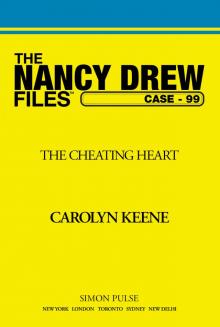 The Cheating Heart
The Cheating Heart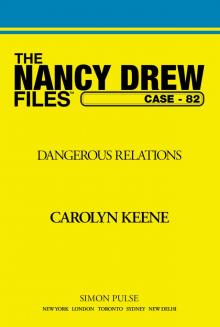 Dangerous Relations
Dangerous Relations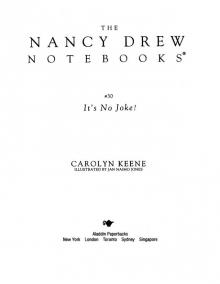 It's No Joke!
It's No Joke!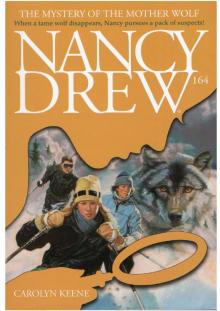 The Mystery of the Mother Wolf
The Mystery of the Mother Wolf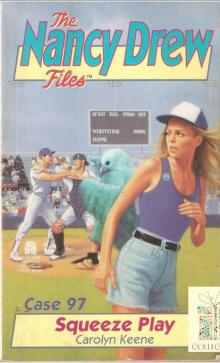 097 Squeeze Play
097 Squeeze Play Secret at Mystic Lake
Secret at Mystic Lake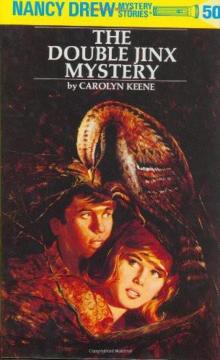 The Double Jinx Mystery
The Double Jinx Mystery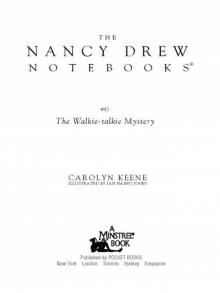 The Walkie Talkie Mystery
The Walkie Talkie Mystery The Case of the Vanishing Veil
The Case of the Vanishing Veil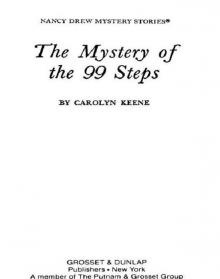 The Mystery of the 99 Steps
The Mystery of the 99 Steps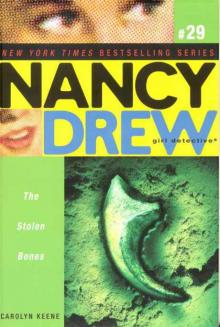 The Stolen Bones
The Stolen Bones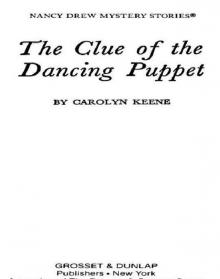 The Clue of the Dancing Puppet
The Clue of the Dancing Puppet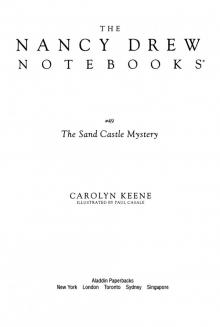 The Sand Castle Mystery
The Sand Castle Mystery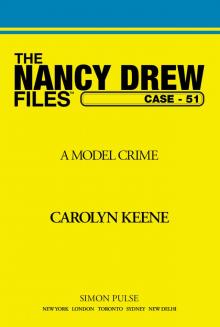 A Model Crime
A Model Crime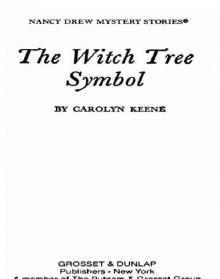 The Witch Tree Symbol
The Witch Tree Symbol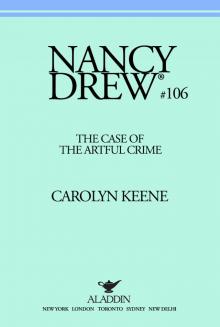 The Case of the Artful Crime
The Case of the Artful Crime Mall Madness
Mall Madness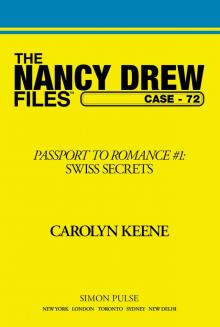 Swiss Secrets
Swiss Secrets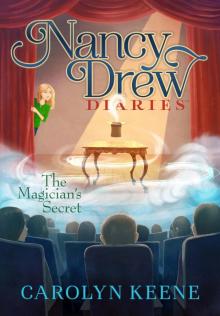 The Magician's Secret
The Magician's Secret Tall, Dark and Deadly
Tall, Dark and Deadly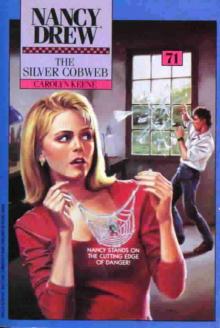 The Silver Cobweb
The Silver Cobweb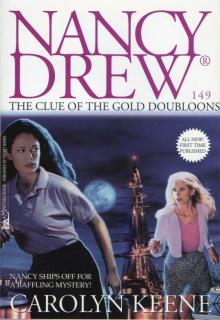 The Clue of the Gold Doubloons
The Clue of the Gold Doubloons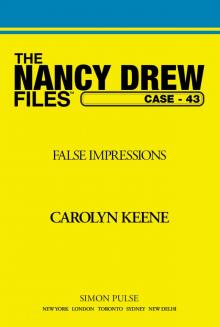 False Impressions
False Impressions Model Suspect
Model Suspect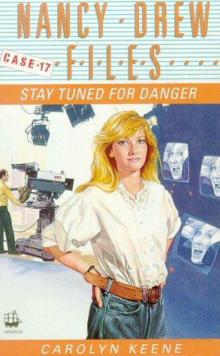 Stay Tuned for Danger
Stay Tuned for Danger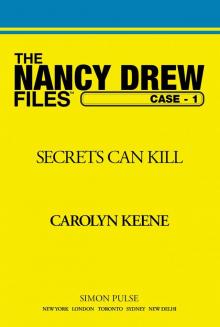 Secrets Can Kill
Secrets Can Kill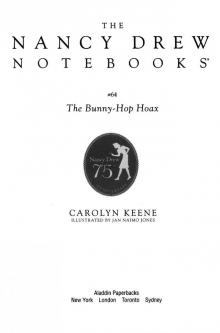 The Bunny-Hop Hoax
The Bunny-Hop Hoax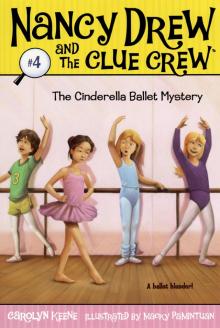 The Cinderella Ballet Mystery
The Cinderella Ballet Mystery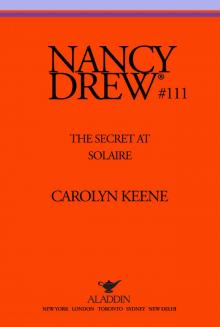 The Secret at Solaire
The Secret at Solaire Trash or Treasure?
Trash or Treasure? The Missing Horse Mystery
The Missing Horse Mystery The Lost Locket
The Lost Locket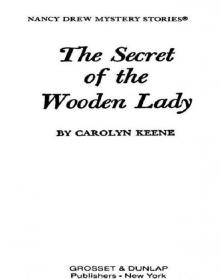 The Secret of the Wooden Lady
The Secret of the Wooden Lady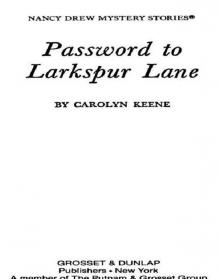 Password to Larkspur Lane
Password to Larkspur Lane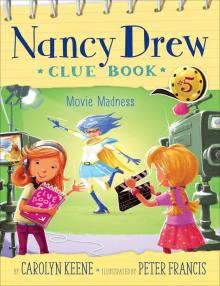 Movie Madness
Movie Madness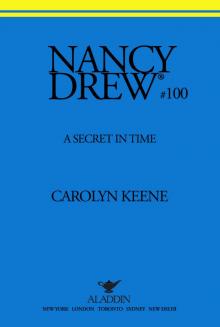 A Secret in Time
A Secret in Time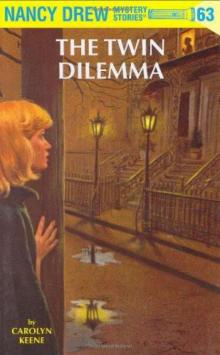 The Twin Dilemma
The Twin Dilemma Candy Is Dandy
Candy Is Dandy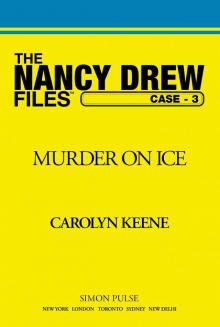 Murder on Ice
Murder on Ice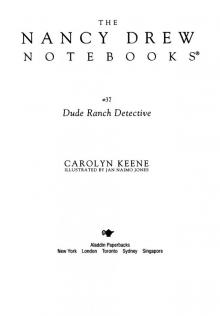 Dude Ranch Detective
Dude Ranch Detective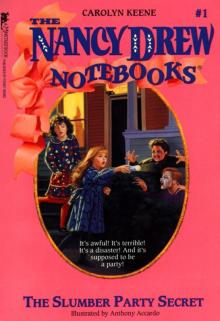 The Slumber Party Secret
The Slumber Party Secret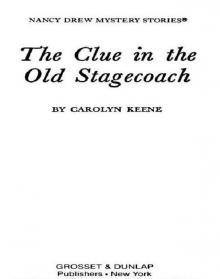 The Clue in the Old Stagecoach
The Clue in the Old Stagecoach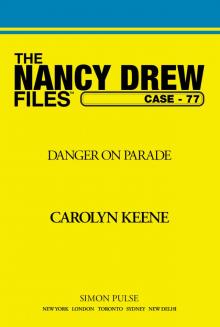 Danger on Parade
Danger on Parade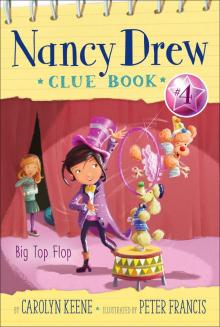 Big Top Flop
Big Top Flop Strangers on a Train
Strangers on a Train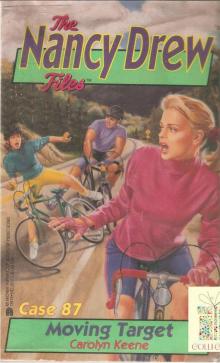 087 Moving Target
087 Moving Target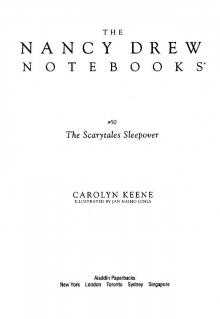 The Scarytales Sleepover
The Scarytales Sleepover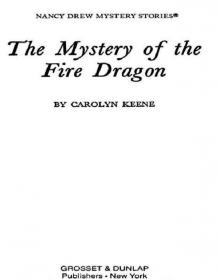 The Mystery of the Fire Dragon
The Mystery of the Fire Dragon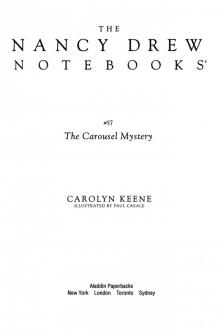 The Carousel Mystery
The Carousel Mystery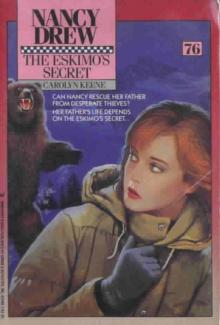 The Eskimo's Secret
The Eskimo's Secret Thrill on the Hill
Thrill on the Hill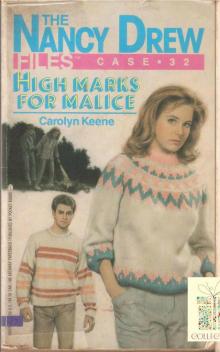 032 High Marks for Malice
032 High Marks for Malice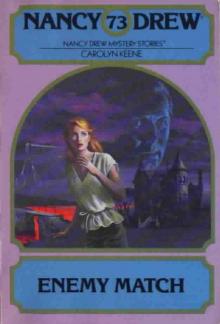 Enemy Match
Enemy Match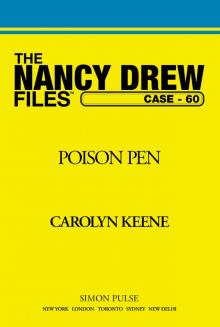 Poison Pen
Poison Pen Lights, Camera . . . Cats!
Lights, Camera . . . Cats! Lost in the Everglades
Lost in the Everglades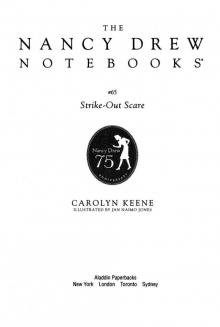 Strike-Out Scare
Strike-Out Scare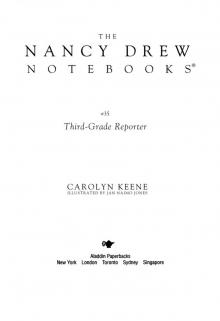 Third-Grade Reporter
Third-Grade Reporter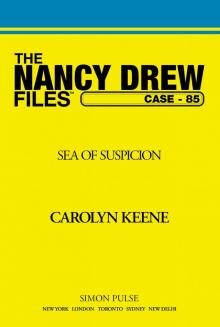 Sea of Suspicion
Sea of Suspicion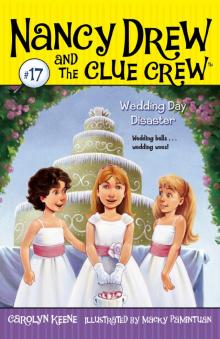 Wedding Day Disaster
Wedding Day Disaster The Make-A-Pet Mystery
The Make-A-Pet Mystery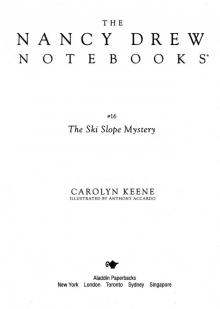 The Ski Slope Mystery
The Ski Slope Mystery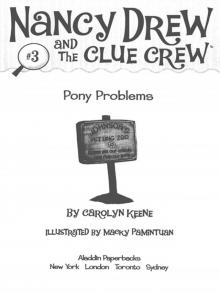 Pony Problems
Pony Problems Candy Kingdom Chaos
Candy Kingdom Chaos The Sign in the Smoke
The Sign in the Smoke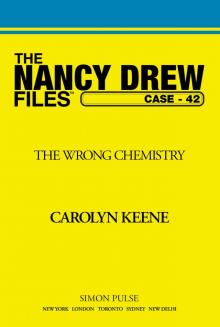 The Wrong Chemistry
The Wrong Chemistry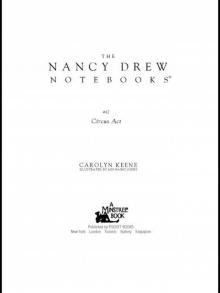 Circus Act
Circus Act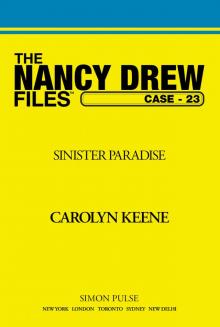 Sinister Paradise
Sinister Paradise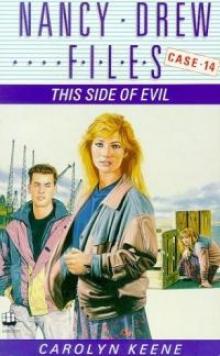 This Side of Evil
This Side of Evil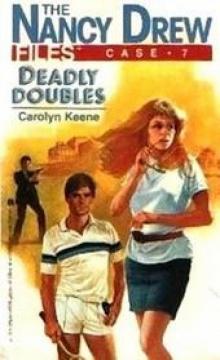 Deadly Doubles
Deadly Doubles The Mystery of the Masked Rider
The Mystery of the Masked Rider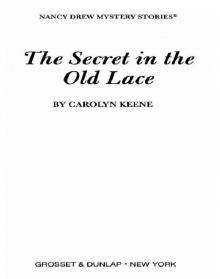 The Secret in the Old Lace
The Secret in the Old Lace The Pen Pal Puzzle
The Pen Pal Puzzle Without a Trace
Without a Trace Whose Pet Is Best?
Whose Pet Is Best?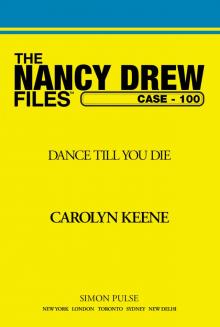 Dance Till You Die
Dance Till You Die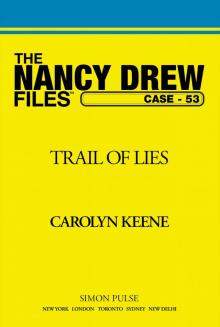 Trail of Lies
Trail of Lies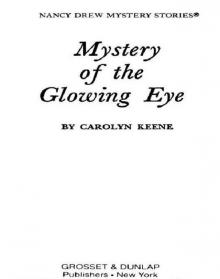 Mystery of the Glowing Eye
Mystery of the Glowing Eye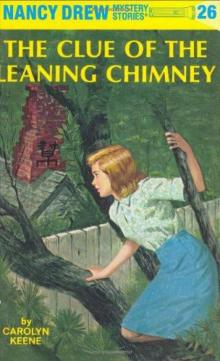 The Clue of the Leaning Chimney
The Clue of the Leaning Chimney The Crook Who Took the Book
The Crook Who Took the Book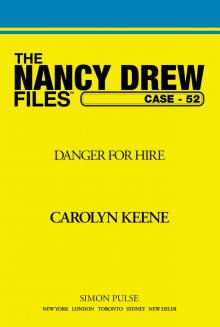 Danger for Hire
Danger for Hire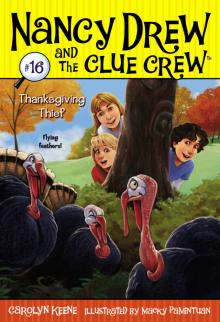 Thanksgiving Thief
Thanksgiving Thief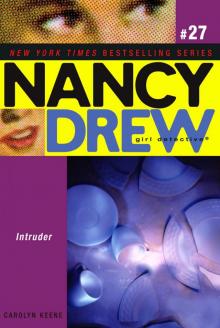 Intruder!
Intruder!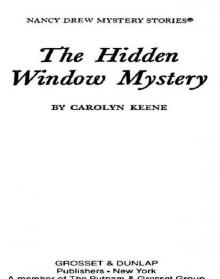 The Hidden Window Mystery
The Hidden Window Mystery Win, Place or Die
Win, Place or Die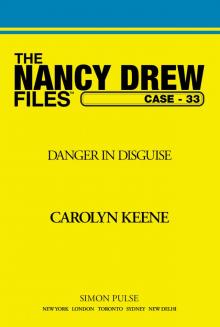 Danger in Disguise
Danger in Disguise The Best Detective
The Best Detective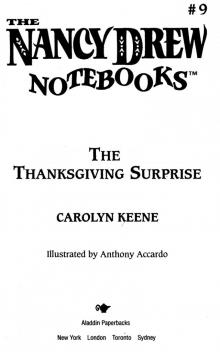 The Thanksgiving Surprise
The Thanksgiving Surprise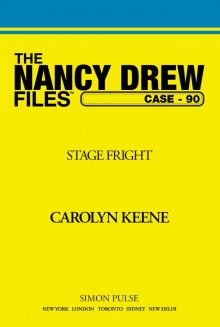 Stage Fright
Stage Fright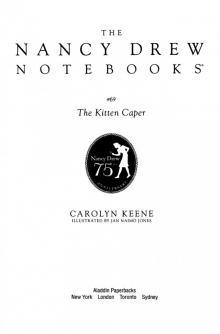 The Kitten Caper
The Kitten Caper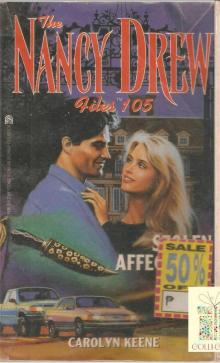 Stolen Affections
Stolen Affections The Phantom of Nantucket
The Phantom of Nantucket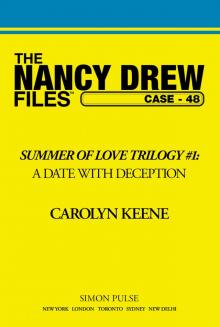 Date With Deception
Date With Deception Cooking Camp Disaster
Cooking Camp Disaster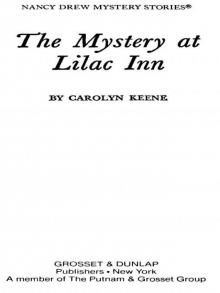 The Mystery at Lilac Inn
The Mystery at Lilac Inn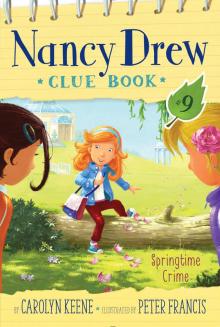 Springtime Crime
Springtime Crime Action!
Action! Into Thin Air
Into Thin Air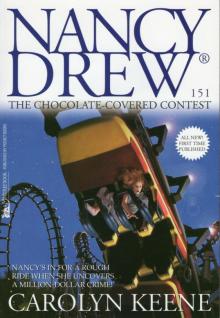 The Chocolate-Covered Contest
The Chocolate-Covered Contest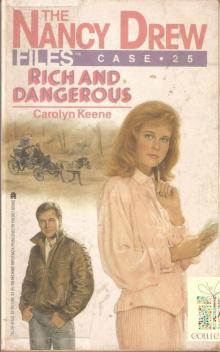 025 Rich and Dangerous
025 Rich and Dangerous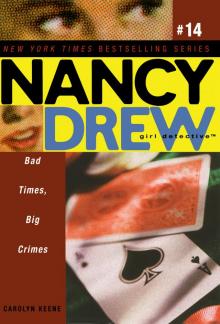 Bad Times, Big Crimes
Bad Times, Big Crimes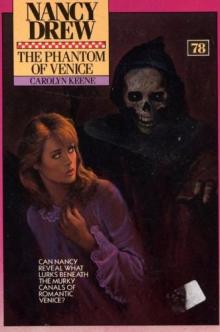 078 The Phantom Of Venice
078 The Phantom Of Venice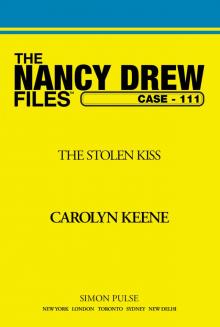 The Stolen Kiss
The Stolen Kiss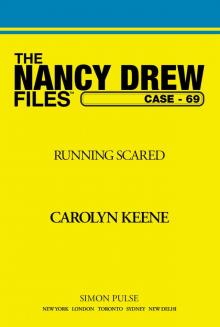 Running Scared
Running Scared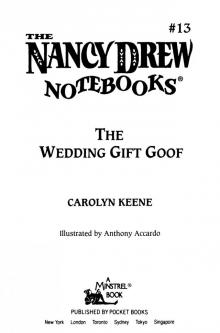 The Wedding Gift Goof
The Wedding Gift Goof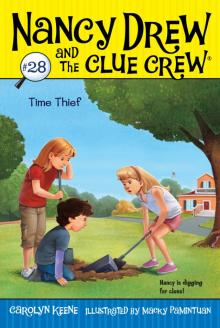 Time Thief
Time Thief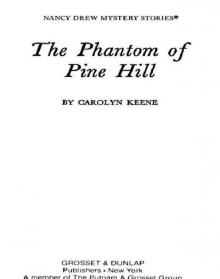 The Phantom of Pine Hill
The Phantom of Pine Hill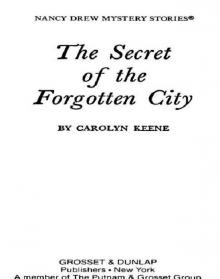 The Secret of the Forgotten City
The Secret of the Forgotten City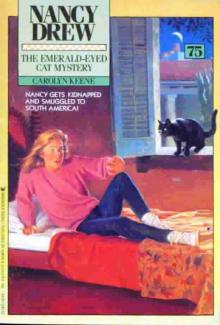 The Emerald-Eyed Cat Mystery
The Emerald-Eyed Cat Mystery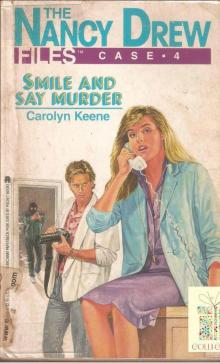 004 Smile and Say Murder
004 Smile and Say Murder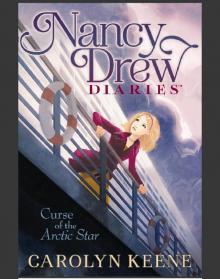 Curse of the Arctic Star
Curse of the Arctic Star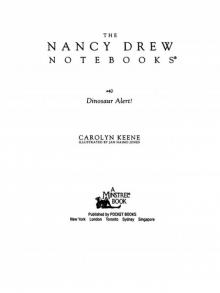 Dinosaur Alert!
Dinosaur Alert!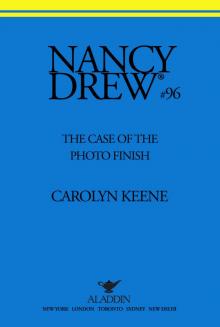 The Case of the Photo Finish
The Case of the Photo Finish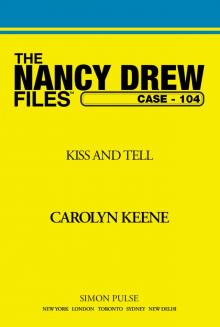 Kiss and Tell
Kiss and Tell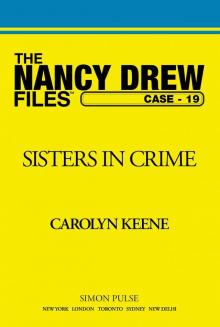 Sisters in Crime
Sisters in Crime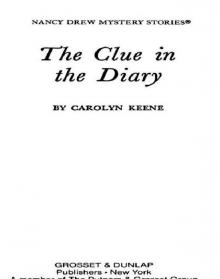 The Clue in the Diary
The Clue in the Diary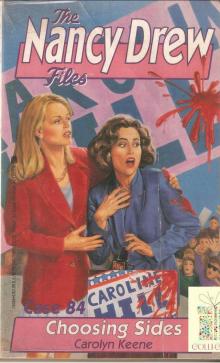 084 Choosing Sides
084 Choosing Sides Haunting of Horse Island
Haunting of Horse Island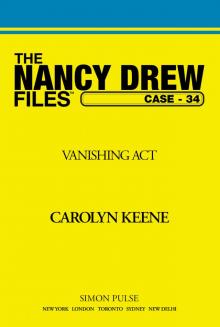 Vanishing Act
Vanishing Act The Big Island Burglary
The Big Island Burglary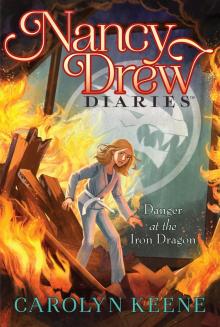 Danger at the Iron Dragon
Danger at the Iron Dragon Pets on Parade
Pets on Parade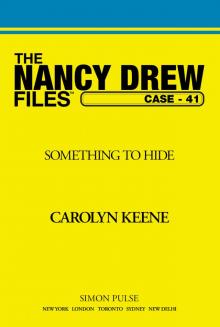 Something to Hide
Something to Hide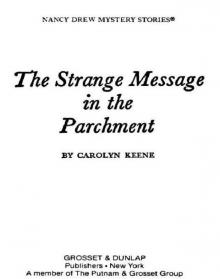 The Strange Message in the Parchment
The Strange Message in the Parchment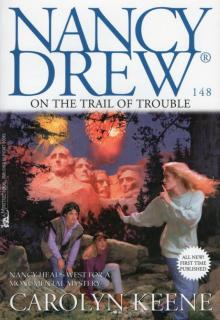 On the Trail of Trouble
On the Trail of Trouble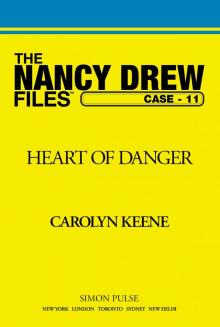 Heart of Danger
Heart of Danger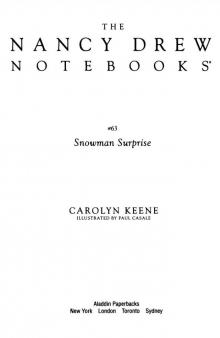 The Snowman Surprise
The Snowman Surprise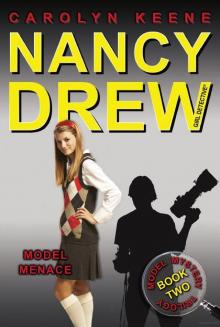 Model Menace
Model Menace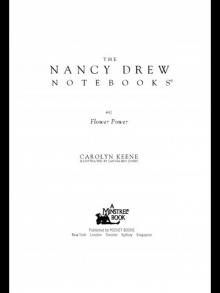 Flower Power
Flower Power The Great Goat Gaffe
The Great Goat Gaffe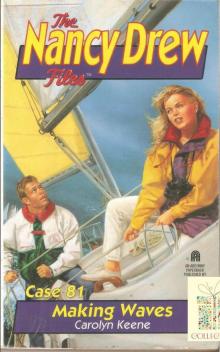 081 Making Waves
081 Making Waves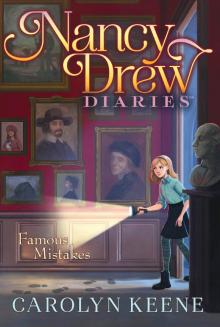 Famous Mistakes
Famous Mistakes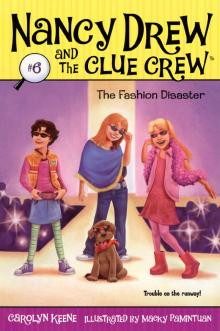 The Fashion Disaster
The Fashion Disaster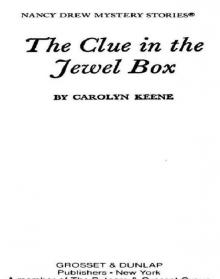 The Clue in the Jewel Box
The Clue in the Jewel Box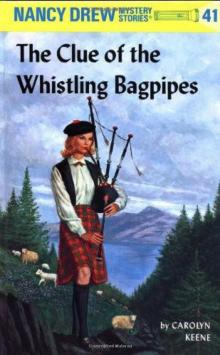 The Clue of the Whistling Bagpipes
The Clue of the Whistling Bagpipes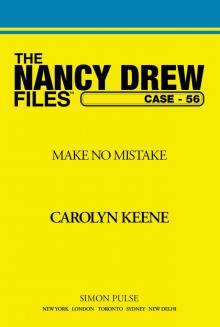 Make No Mistake
Make No Mistake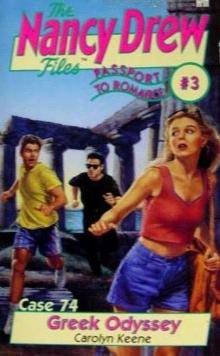 Greek Odyssey
Greek Odyssey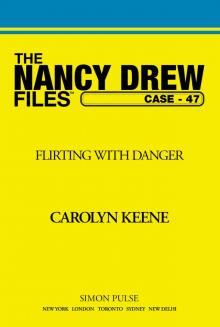 Flirting With Danger
Flirting With Danger Double Take
Double Take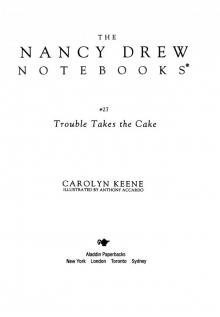 Trouble Takes the Cake
Trouble Takes the Cake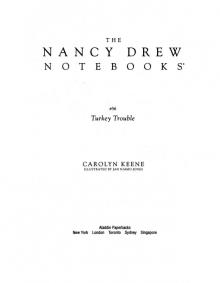 Turkey Trouble
Turkey Trouble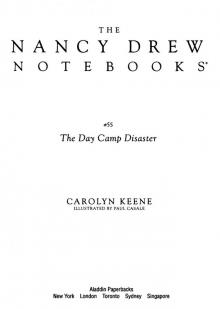 The Day Camp Disaster
The Day Camp Disaster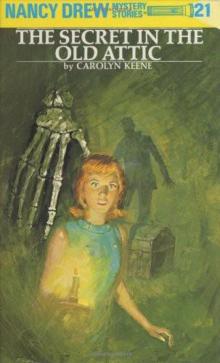 The Secret in the Old Attic
The Secret in the Old Attic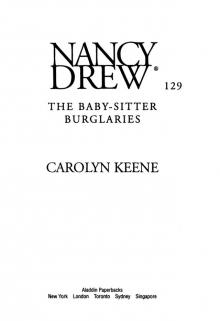 The Baby-Sitter Burglaries
The Baby-Sitter Burglaries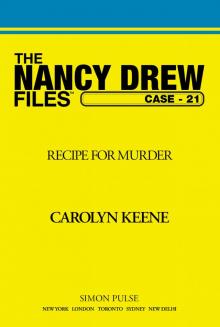 Recipe for Murder
Recipe for Murder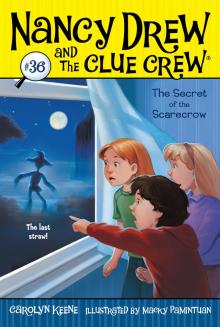 The Secret of the Scarecrow
The Secret of the Scarecrow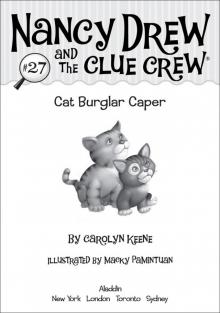 Cat Burglar Caper
Cat Burglar Caper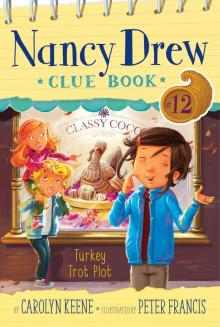 Turkey Trot Plot
Turkey Trot Plot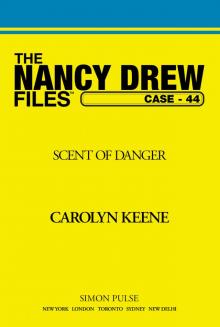 Scent of Danger
Scent of Danger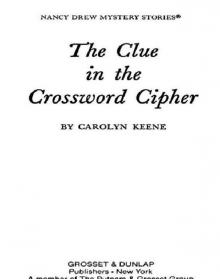 The Clue in the Crossword Cipher
The Clue in the Crossword Cipher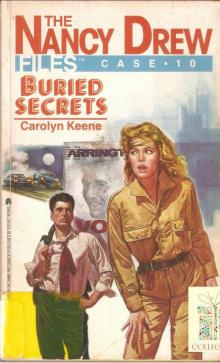 010 Buried Secrets
010 Buried Secrets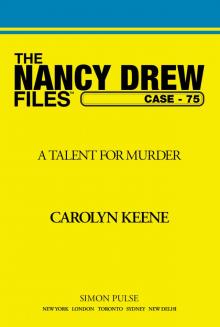 A Talent for Murder
A Talent for Murder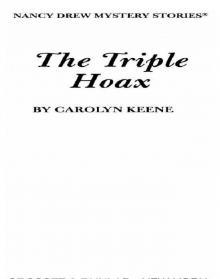 The Triple Hoax
The Triple Hoax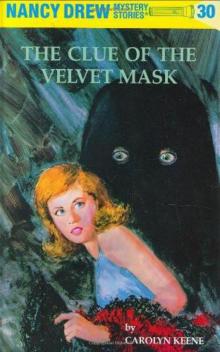 The Clue of the Velvet Mask
The Clue of the Velvet Mask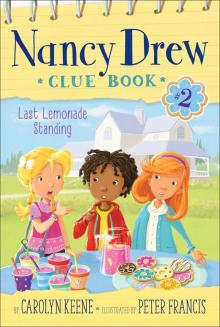 Last Lemonade Standing
Last Lemonade Standing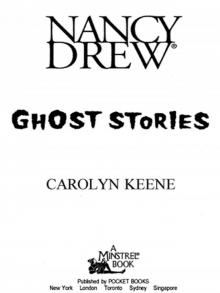 The Ghost of Blackwood Hall
The Ghost of Blackwood Hall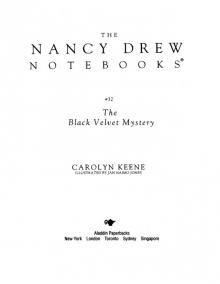 The Black Velvet Mystery
The Black Velvet Mystery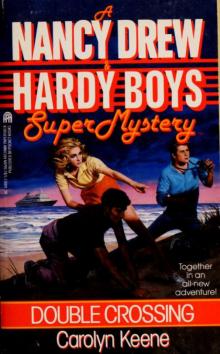 Double Crossing
Double Crossing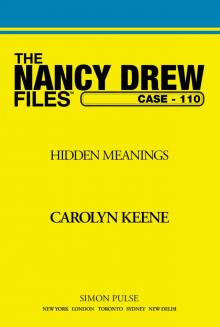 Hidden Meanings
Hidden Meanings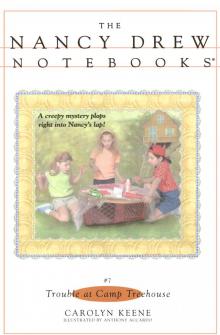 Trouble at Camp Treehouse
Trouble at Camp Treehouse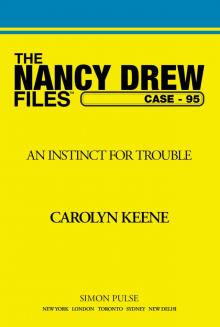 An Instinct for Trouble
An Instinct for Trouble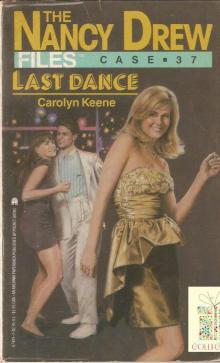 037 Last Dance
037 Last Dance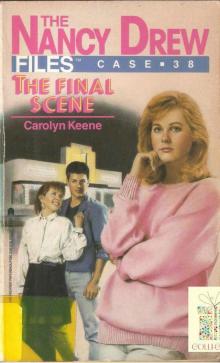 038 The Final Scene
038 The Final Scene Duck Derby Debacle
Duck Derby Debacle The Pumpkin Patch Puzzle
The Pumpkin Patch Puzzle Hidden Pictures
Hidden Pictures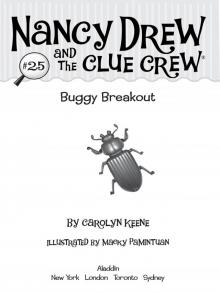 Buggy Breakout
Buggy Breakout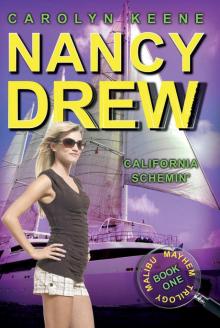 California Schemin'
California Schemin'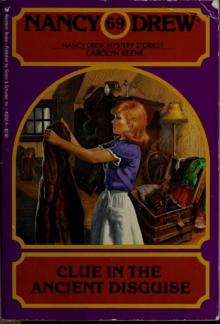 Clue in the Ancient Disguise
Clue in the Ancient Disguise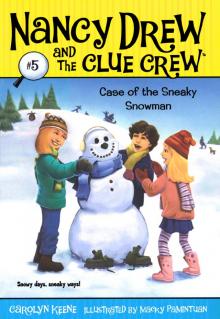 Case of the Sneaky Snowman
Case of the Sneaky Snowman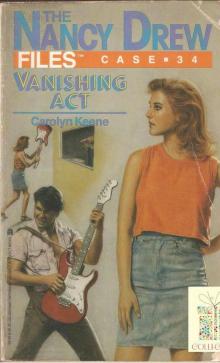 034 Vanishing Act
034 Vanishing Act A Script for Danger
A Script for Danger The Flower Show Fiasco
The Flower Show Fiasco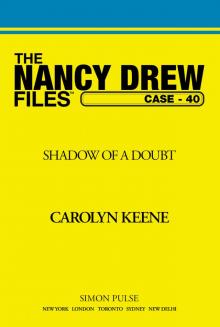 Shadow of a Doubt
Shadow of a Doubt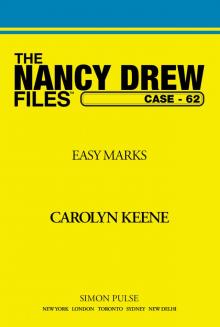 Easy Marks
Easy Marks Alien in the Classroom
Alien in the Classroom Ghost Stories, #2 (Nancy Drew)
Ghost Stories, #2 (Nancy Drew)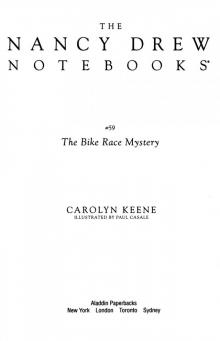 The Bike Race Mystery
The Bike Race Mystery False Pretenses
False Pretenses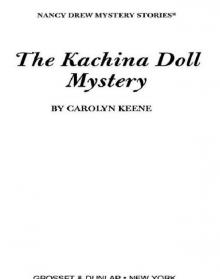 The Kachina Doll Mystery
The Kachina Doll Mystery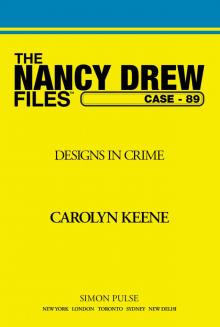 Designs in Crime
Designs in Crime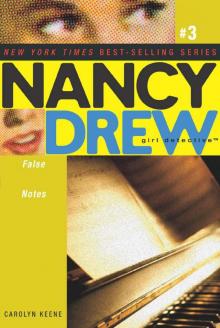 False Notes
False Notes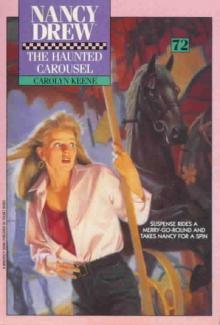 The Haunted Carousel
The Haunted Carousel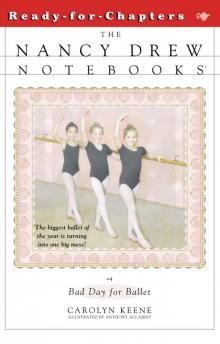 Bad Day for Ballet
Bad Day for Ballet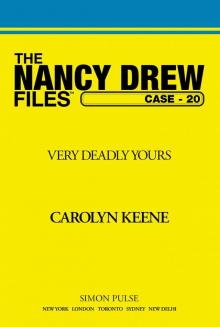 Very Deadly Yours
Very Deadly Yours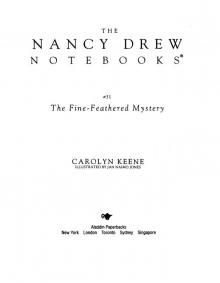 The Fine-Feathered Mystery
The Fine-Feathered Mystery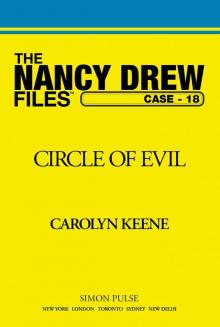 Circle of Evil
Circle of Evil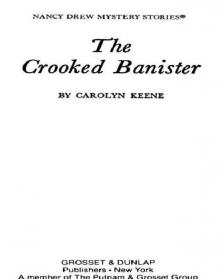 The Crooked Banister
The Crooked Banister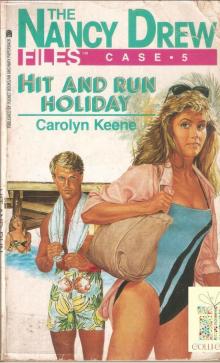 005 Hit and Run Holiday
005 Hit and Run Holiday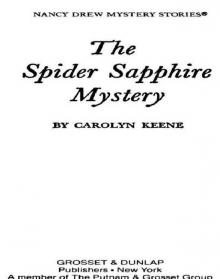 The Spider Sapphire Mystery
The Spider Sapphire Mystery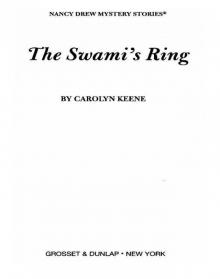 The Swami's Ring
The Swami's Ring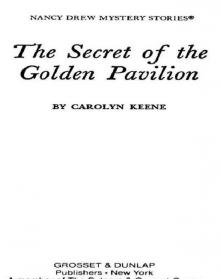 The Secret of the Golden Pavilion
The Secret of the Golden Pavilion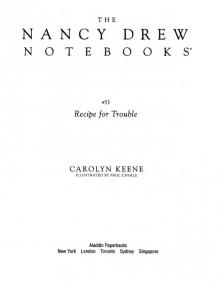 Recipe for Trouble
Recipe for Trouble Betrayed by Love
Betrayed by Love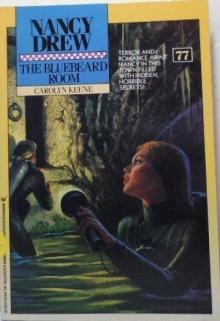 The Bluebeard Room
The Bluebeard Room Sweet Revenge
Sweet Revenge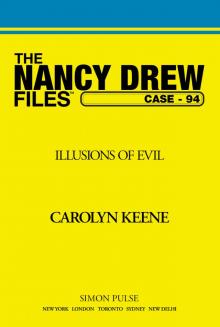 Illusions of Evil
Illusions of Evil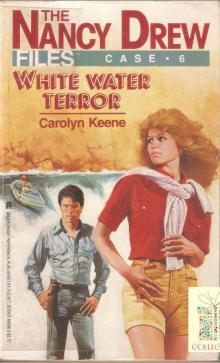 006 White Water Terror
006 White Water Terror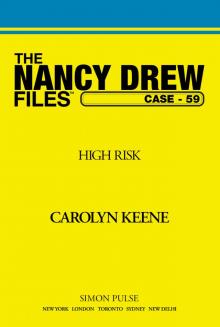 High Risk
High Risk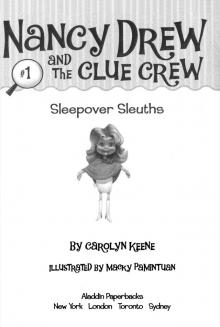 Sleepover Sleuths
Sleepover Sleuths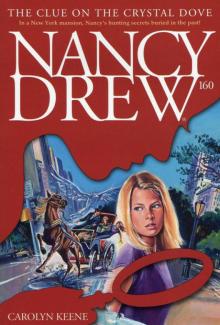 The Clue on the Crystal Dove
The Clue on the Crystal Dove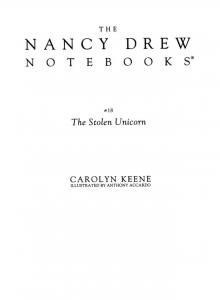 The Stolen Unicorn
The Stolen Unicorn The Professor and the Puzzle
The Professor and the Puzzle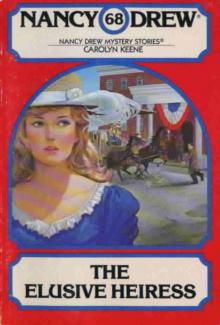 The Elusive Heiress
The Elusive Heiress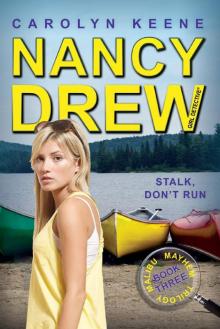 Stalk, Don't Run
Stalk, Don't Run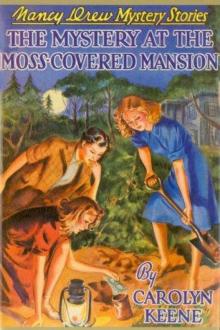 The Mystery at the Moss-Covered Mansion
The Mystery at the Moss-Covered Mansion The Tortoise and the Scare
The Tortoise and the Scare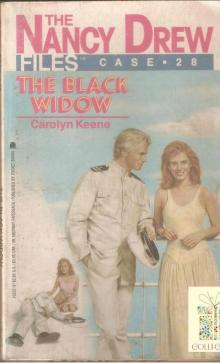 028 The Black Widow
028 The Black Widow Big Worry in Wonderland
Big Worry in Wonderland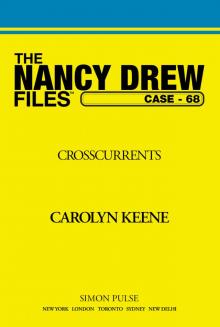 Crosscurrents
Crosscurrents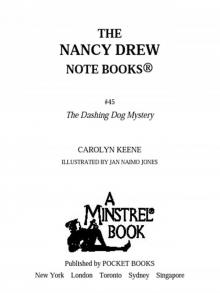 The Dashing Dog Mystery
The Dashing Dog Mystery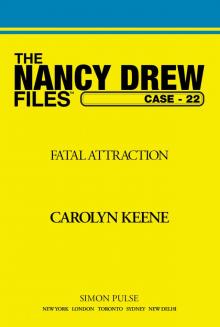 Fatal Attraction
Fatal Attraction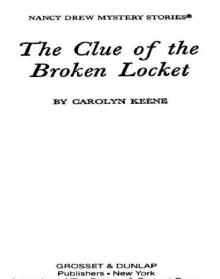 The Clue of the Broken Locket
The Clue of the Broken Locket The Stinky Cheese Surprise
The Stinky Cheese Surprise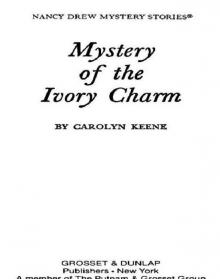 Mystery of the Ivory Charm
Mystery of the Ivory Charm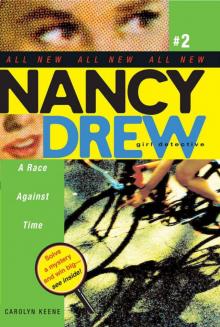 A Race Against Time
A Race Against Time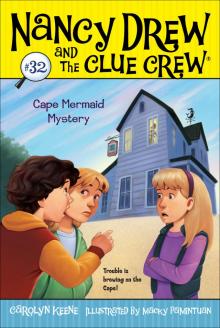 Cape Mermaid Mystery
Cape Mermaid Mystery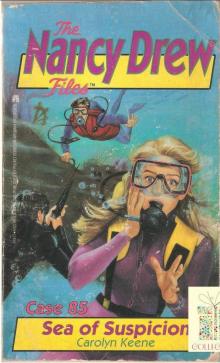 085 Sea of Suspicion
085 Sea of Suspicion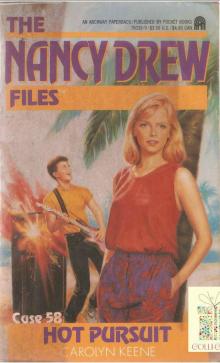 058 Hot Pursuit
058 Hot Pursuit The Secret in the Spooky Woods
The Secret in the Spooky Woods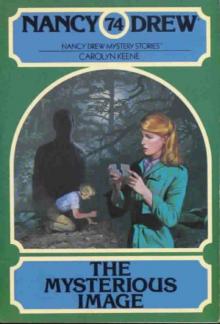 The Mysterious Image
The Mysterious Image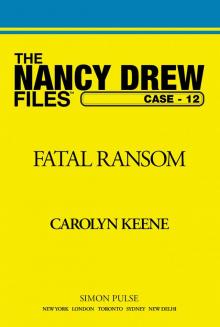 Fatal Ransom
Fatal Ransom The Stolen Show
The Stolen Show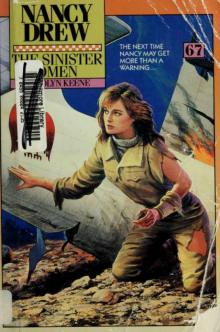 The Sinister Omen
The Sinister Omen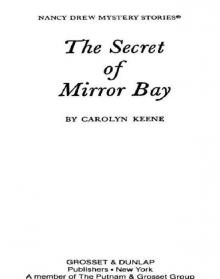 The Secret of Mirror Bay
The Secret of Mirror Bay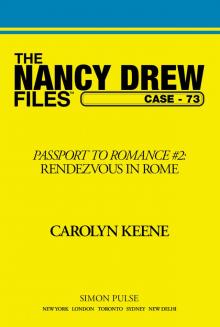 Rendezvous in Rome
Rendezvous in Rome The Perfect Plot
The Perfect Plot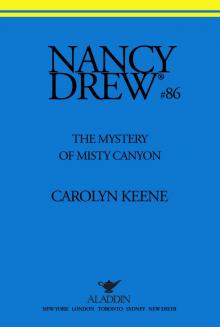 The Mystery of Misty Canyon
The Mystery of Misty Canyon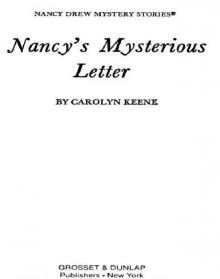 Nancy's Mysterious Letter
Nancy's Mysterious Letter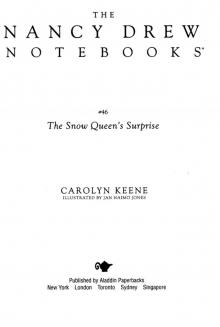 The Snow Queen's Surprise
The Snow Queen's Surprise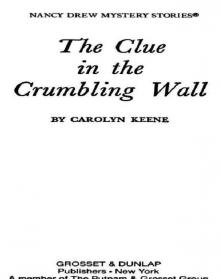 The Clue in the Crumbling Wall
The Clue in the Crumbling Wall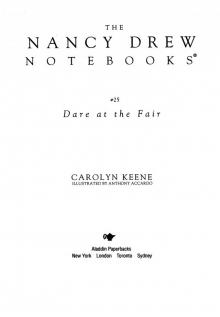 Dare at the Fair
Dare at the Fair Scream for Ice Cream
Scream for Ice Cream A Star Witness
A Star Witness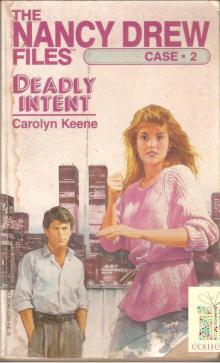 002 Deadly Intent
002 Deadly Intent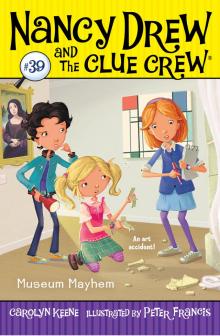 Museum Mayhem
Museum Mayhem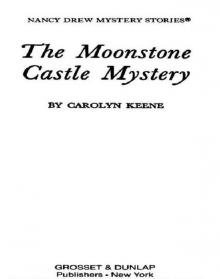 The Moonstone Castle Mystery
The Moonstone Castle Mystery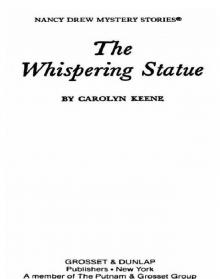 The Whispering Statue
The Whispering Statue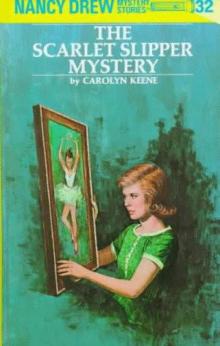 The Scarlet Slipper Mystery
The Scarlet Slipper Mystery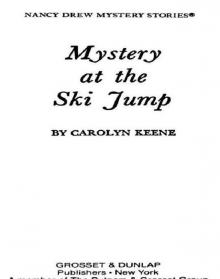 Mystery at the Ski Jump
Mystery at the Ski Jump Hot Pursuit
Hot Pursuit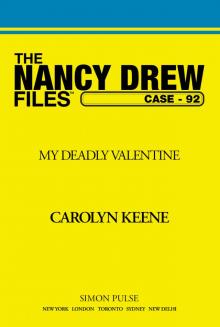 My Deadly Valentine
My Deadly Valentine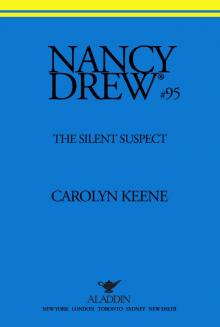 The Silent Suspect
The Silent Suspect Deep Secrets
Deep Secrets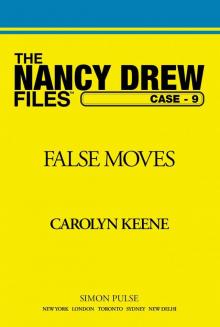 False Moves
False Moves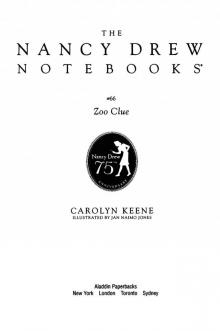 The Zoo Crew
The Zoo Crew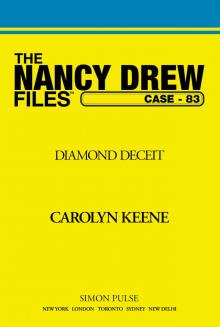 Diamond Deceit
Diamond Deceit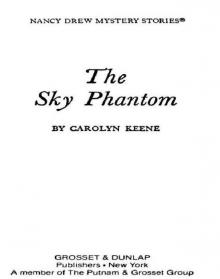 The Sky Phantom
The Sky Phantom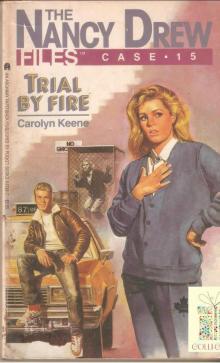 015 Trial by Fire
015 Trial by Fire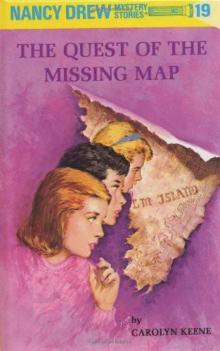 The Quest of the Missing Map
The Quest of the Missing Map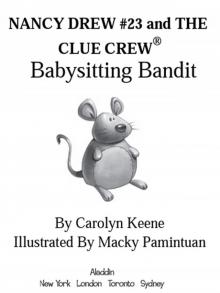 Babysitting Bandit
Babysitting Bandit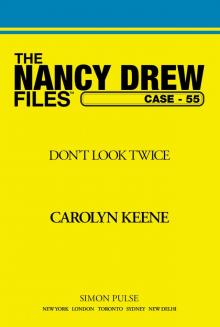 Don't Look Twice
Don't Look Twice Never Say Die
Never Say Die The Soccer Shoe Clue
The Soccer Shoe Clue Pool Party Puzzler
Pool Party Puzzler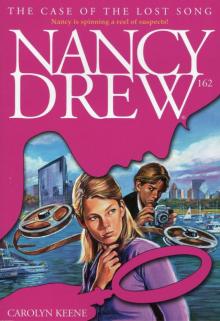 The Case of the Lost Song
The Case of the Lost Song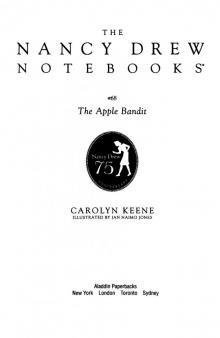 The Apple Bandit
The Apple Bandit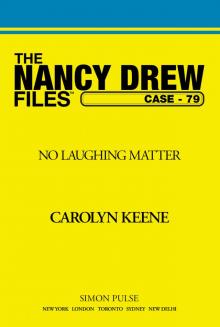 No Laughing Matter
No Laughing Matter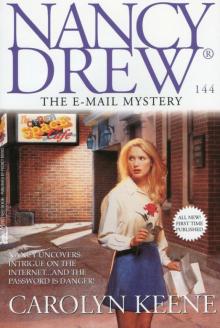 The Thirteenth Pearl
The Thirteenth Pearl Sabotage at Willow Woods
Sabotage at Willow Woods Butterfly Blues
Butterfly Blues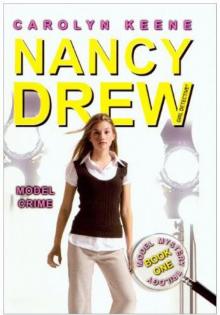 Model Crime 1
Model Crime 1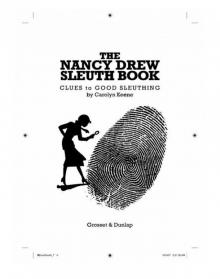 The Nancy Drew Sleuth Book
The Nancy Drew Sleuth Book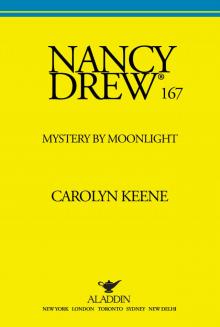 Mystery by Moonlight
Mystery by Moonlight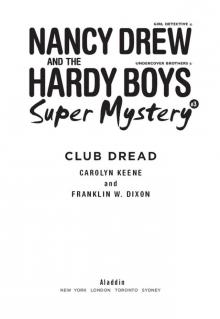 Club Dread
Club Dread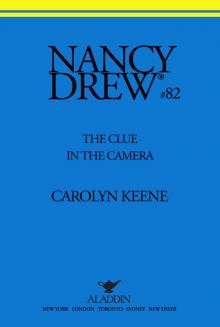 The Clue in the Camera
The Clue in the Camera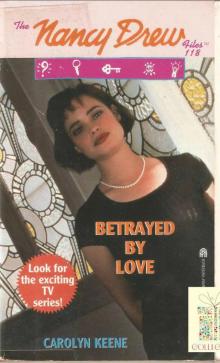 118 Betrayed By Love
118 Betrayed By Love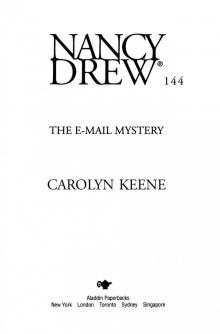 The E-Mail Mystery (Nancy Drew Book 144)
The E-Mail Mystery (Nancy Drew Book 144)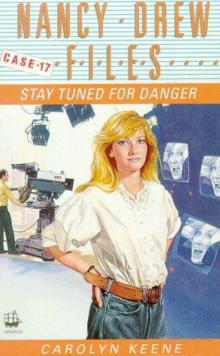 Stay Tuned for Danger: Circle of Evil
Stay Tuned for Danger: Circle of Evil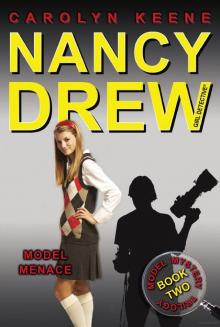 Model Menace 2
Model Menace 2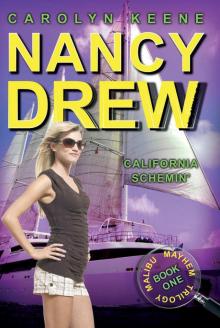 California Schemin': Book One in the Malibu Mayhem Trilogy
California Schemin': Book One in the Malibu Mayhem Trilogy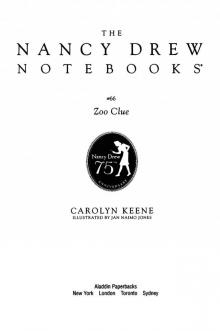 Zoo Clue (Nancy Drew Notebooks)
Zoo Clue (Nancy Drew Notebooks)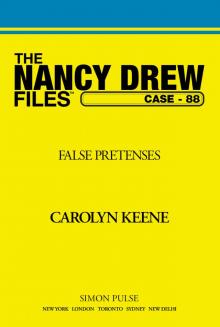 False Pretences
False Pretences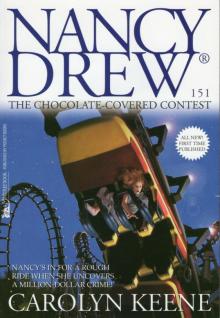 151 The Chocolate-Covered Contest
151 The Chocolate-Covered Contest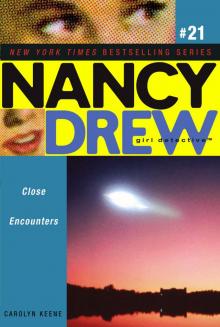 Close Encounters
Close Encounters The Emeral-Eyed Cat Mystery
The Emeral-Eyed Cat Mystery Boo Crew
Boo Crew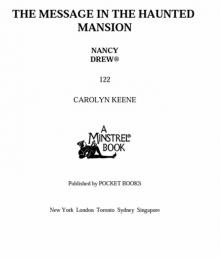 The Message in the Haunted Mansion (Nancy Drew Book 122)
The Message in the Haunted Mansion (Nancy Drew Book 122) A Nancy Drew Christmas
A Nancy Drew Christmas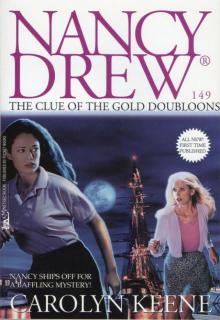 149 The Clue Of The Gold Doubloons
149 The Clue Of The Gold Doubloons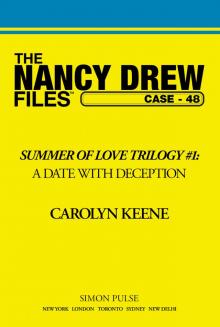 A Date with Deception
A Date with Deception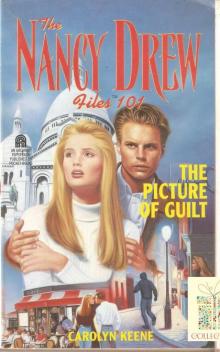 101 The Picture of Guilt
101 The Picture of Guilt The Secret in the Spooky Woods (Nancy Drew Notebooks Book 62)
The Secret in the Spooky Woods (Nancy Drew Notebooks Book 62)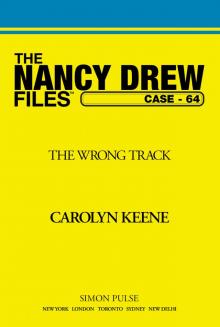 The Wrong Track
The Wrong Track Lights! Camera! Clues!
Lights! Camera! Clues!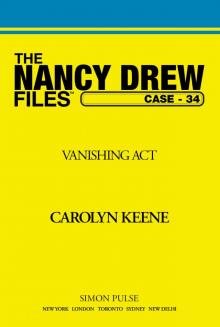 The Vanishing Act
The Vanishing Act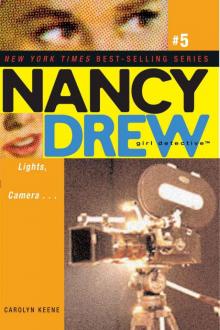 Lights, Camera . . .
Lights, Camera . . . Model Suspect 3
Model Suspect 3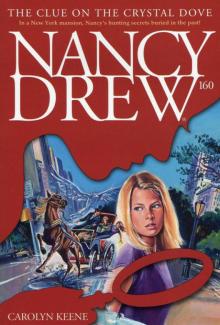 160 The Clue On The Crystal Dove
160 The Clue On The Crystal Dove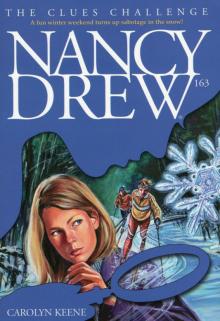 163 The Clues Challenge
163 The Clues Challenge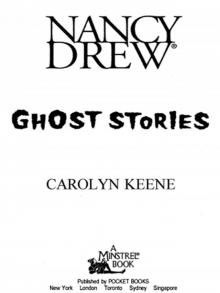 Ghost Stories (Nancy Drew)
Ghost Stories (Nancy Drew)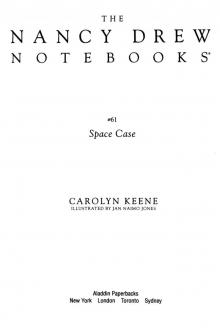 Space Case (Nancy Drew Notebooks Book 61)
Space Case (Nancy Drew Notebooks Book 61)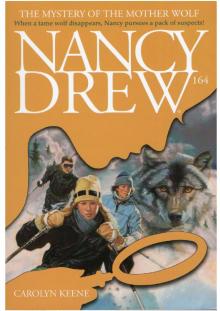 164 The Mystery Of The Mother Wolf
164 The Mystery Of The Mother Wolf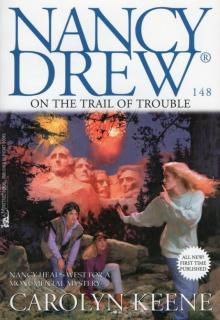 148 On The Trail Of Trouble
148 On The Trail Of Trouble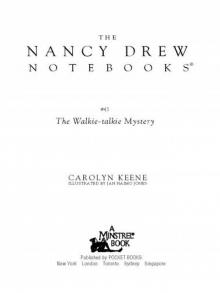 The Walkie-Talkie Mystery
The Walkie-Talkie Mystery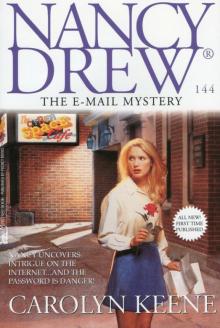 The E-Mail Mystery
The E-Mail Mystery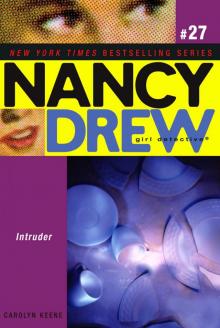 Intruder (Nancy Drew (All New) Girl Detective)
Intruder (Nancy Drew (All New) Girl Detective)![The Stolen Relic [Nancy Drew Girl Detective 007] Read online](http://i1.bookreadfree.com/i2/04/11/the_stolen_relic_nancy_drew_girl_detective_007_preview.jpg) The Stolen Relic [Nancy Drew Girl Detective 007]
The Stolen Relic [Nancy Drew Girl Detective 007]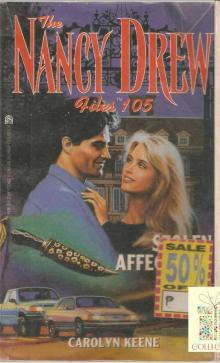 105 Stolen Affections
105 Stolen Affections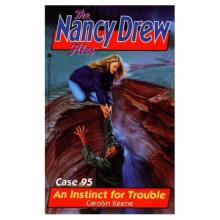 An Instict for Trouble
An Instict for Trouble 161 Lost In The Everglades
161 Lost In The Everglades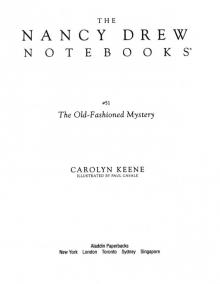 The Old-Fashioned Mystery
The Old-Fashioned Mystery Perfect Plot
Perfect Plot